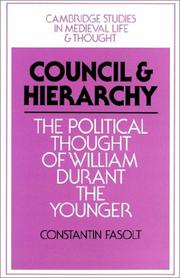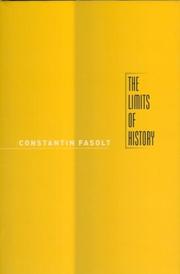| Listing 1 - 9 of 9 |
Sort by
|
Book
ISSN: 15734188 ISBN: 9789004268920 9789004269576 9004268928 1306689716 9004269576 Year: 2014 Volume: 182 Publisher: Leiden: Brill,
Abstract | Keywords | Export | Availability | Bookmark
 Loading...
Loading...Choose an application
- Reference Manager
- EndNote
- RefWorks (Direct export to RefWorks)
The twenty studies collected in this volume focus on the transition from the Middle Ages to the modern world. The method leads from technical investigations on William Durant the Younger (ca. 1266-1330) and Hermann Conring (1606-1681) through reflection on the nature of historical knowledge to a break with historicism, an affirmation of anachronism, and a broad perspective on the history of Europe. The introduction explains when and why these studies were written, and places them in the context of contemporary historical thinking by drawing on Wittgenstein's Philosophical Investigations . This book will appeal to historians with an interest in historical theory, historians of late medieval and early modern Europe, and students looking for the meaning of history.
Christian church history --- History of Europe --- anno 500-1499 --- anno 1400-1499 --- anno 1600-1699 --- anno 1500-1599 --- Middle Ages --- Church history --- Reformation --- Moyen Age --- Eglise --- Réforme (Christianisme) --- Historiography. --- Historiography., --- Historiographie --- Histoire --- Duranti, William, --- Conring, Hermann, --- Criticism and interpretation --- Europe --- History --- Histoire religieuse --- Criticism and interpretation. --- Histoire. --- Réforme (Christianisme) --- Middle Ages - Historiography. --- Church history - Middle Ages, 600-1500 - Historiography. --- Reformation - Historiography., --- Duranti, William, - -1330? - Criticism and interpretation. --- Conring, Hermann, - 1606-1681 - Criticism and interpretation. --- Duranti, William, - -1330? - Tractatus de modo generalis concilii celebrandi. --- Europe - History - 476-1492 - Historiography. --- Europe - History - 1492-1648 - Historiography. --- Europe - Church history - Historiography. --- Duranti, William, - -1330? --- Conring, Hermann, - 1606-1681

ISBN: 0521392853 0521894085 0511523165 Year: 1991 Publisher: Cambridge : Cambridge University Press,
Abstract | Keywords | Export | Availability | Bookmark
 Loading...
Loading...Choose an application
- Reference Manager
- EndNote
- RefWorks (Direct export to RefWorks)
In 1311, at the council of Vienne, William Durant the Younger (c. 1266-1330), the French bishop and count, demanded that general councils ought to meet every ten years in order to place effective limits on the papal plenitude of power because 'what touches all must be approved by all'. This is the first systematic interpretation of William Durant's remarkable project to transfer supreme legislative authority from the papacy to general councils. It suggests that the conciliar theory has a more ambivalent complexion than is sometimes recognized. It confirms, on the one hand, that constitutional ideas were deeply embedded in the tradition of the church, which enabled Durant to anticipate the council of Constance by more than a hundred years. On the other hand, Durant attributed an authority to ancient law that overrode his republican ideas, sapped their vitality, and launched him on a pursuit of the true meaning of the law that could end only in his transformation into an historian and a reluctant champion of monarchy. William Durant the Younger's ideas thus help us to understand both the origins of the conciliar theory and the transition from late medieval reform movements to early modern humanism and princely sovereignty.
Church and state --- -Popes --- -Holy See --- See, Holy --- Papacy --- Christianity and state --- Separation of church and state --- State and church --- State, The --- History --- Temporal power --- Duranti, William --- -Contributions in political science --- -History --- Popes --- Church history --- Temporal power of religious rulers --- Roman question --- Duranti, William, --- Durand, Guillaume, --- Durandus, Guillelmus, --- Durandus, Wilhelm, --- Durandus, William, --- Durant, William, --- Political and social views. --- Arts and Humanities --- History. --- Temporal power.

ISBN: 0226239101 Year: 2004 Publisher: Chicago : University of Chicago Press,
Abstract | Keywords | Export | Availability | Bookmark
 Loading...
Loading...Choose an application
- Reference Manager
- EndNote
- RefWorks (Direct export to RefWorks)
Historiography. --- History --- History, Ancient --- Philosophy. --- Conring, Hermann, --- Bartolo,
Book
ISBN: 022610124X 9780226101248 Year: 2013 Publisher: Chicago (Ill.) : University of Chicago press,
Abstract | Keywords | Export | Availability | Bookmark
 Loading...
Loading...Choose an application
- Reference Manager
- EndNote
- RefWorks (Direct export to RefWorks)
History --- Historiography. --- History, Ancient --- Philosophy. --- Conring, Hermann, --- Bartolo,
Book
ISBN: 9004269576 Year: 2014 Publisher: Leiden, Netherlands : Koninklijke Brill,
Abstract | Keywords | Export | Availability | Bookmark
 Loading...
Loading...Choose an application
- Reference Manager
- EndNote
- RefWorks (Direct export to RefWorks)
The twenty studies collected in this volume focus on the transition from the Middle Ages to the modern world. The method leads from technical investigations on William Durant the Younger (ca. 1266-1330) and Hermann Conring (1606-1681) through reflection on the nature of historical knowledge to a break with historicism, an affirmation of anachronism, and a broad perspective on the history of Europe. The introduction explains when and why these studies were written, and places them in the context of contemporary historical thinking by drawing on Wittgenstein's Philosophical Investigations . This book will appeal to historians with an interest in historical theory, historians of late medieval and early modern Europe, and students looking for the meaning of history.
Middle Ages --- Historiography. --- Duranti, William, --- Conring, Hermann, --- Criticism and interpretation. --- Europe --- History --- Church history
Book
Year: 1978 Publisher: [S.l.] [s.n.]
Abstract | Keywords | Export | Availability | Bookmark
 Loading...
Loading...Choose an application
- Reference Manager
- EndNote
- RefWorks (Direct export to RefWorks)
Article
Abstract | Keywords | Export | Availability | Bookmark
 Loading...
Loading...Choose an application
- Reference Manager
- EndNote
- RefWorks (Direct export to RefWorks)
Periodical
Abstract | Keywords | Export | Availability | Bookmark
 Loading...
Loading...Choose an application
- Reference Manager
- EndNote
- RefWorks (Direct export to RefWorks)
Book
Year: 2005 Publisher: Tempe, AZ Arizona Center for Medieval and Renaissance Studies
Abstract | Keywords | Export | Availability | Bookmark
 Loading...
Loading...Choose an application
- Reference Manager
- EndNote
- RefWorks (Direct export to RefWorks)
| Listing 1 - 9 of 9 |
Sort by
|

 Search
Search Feedback
Feedback About UniCat
About UniCat  Help
Help News
News